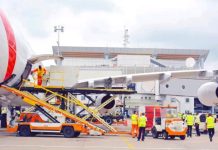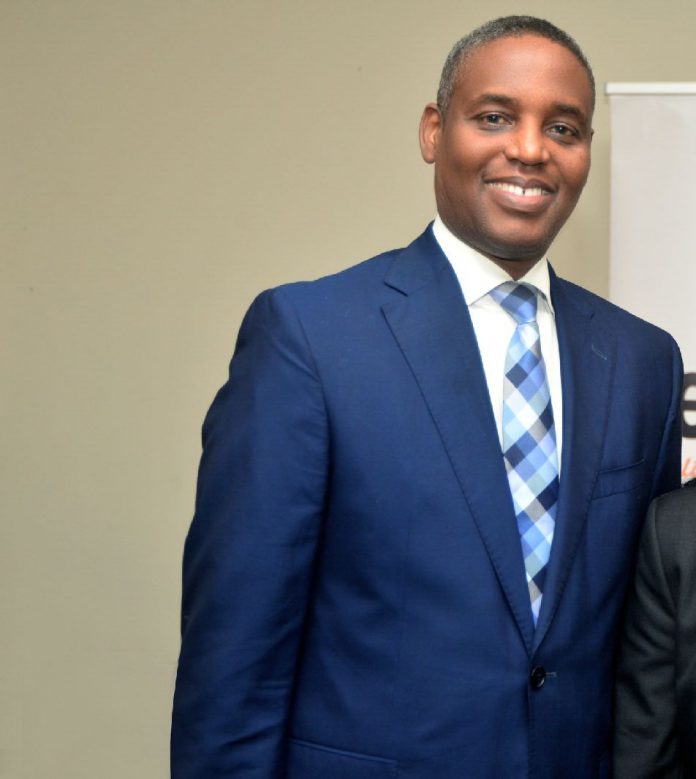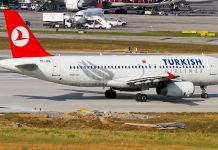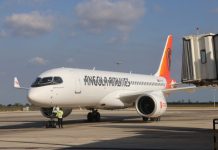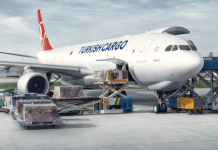Aero Contractors aims to achieve an operating profit of USD1.2 million to USD2 million by the end of 2024 as it expands its fleet with the reintroduction of two more aircraft and adds more routes to its domestic network, according to CEO and Managing Director Ado Sanusi.
Speaking to ch-aviation at the recent Aviation Africa Summit 2024 in Johannesburg, South Africa, he said the Nigerian carrier – in receivership under the federal state-owned Asset Management Corporation of Nigeria (AMCON) since 2016 – reported an operating profit of nearly NGN500 million naira (USD 308,923) for the first half of this year. “It’s modest, but it shows that we can make a profit operating with only two aircraft. I believe by the end of the year, we will grow to USD1.2 million to USD2 million in operating profit,” he said.
According to Sanusi, the airline currently operates two B737-300s but plans to reintroduce two of its three B737-500s by the end of the year. The first B737-500 is expected to begin operations in the second week of October, while the second is anticipated to start flying in early December. The airline’s -500s are owned by Oceanic Capital and managed by AMCON, while the -300s are owned by the Cross Rover State Government, according to ch-aviation fleets data. A B737-400 has been repossessed by owner SKY Leasing and sold on, Sanusi confirmed.
He said Aero Contractors currently operates 16 to 18 flights daily, carrying about 1,300 passengers. The goal is to increase this to more than 20 daily flights and boost passenger numbers to 1,800-2,000 thereby enhancing revenue. Current a day, routes include Lagos, Abuja, Port Harcourt, Calabar, Benin City, Asaba, Sokoto, Yola, and Kano, with plans to add Owerri, Uyo, Maiduguri, and possibly Enugu by the end of the year, supported by the reintroduction of the two additional aircraft.
When asked about regional expansion, Sanusi said the airline would focus on domestic growth for now, aiming for organic development. Future regional growth would be considered pending new investors. “We don’t want to grow too fast because when you grow fast, you can’t control the growth. When we have new investors, then we will start looking at regional markets.”
Meanwhile, Aero Contractors wet-leases a B777-200ER widebody from Terra Avia on a seasonal basis for Hajj charters. Sanusi said the carrier is exploring greater cooperation with the Moldovan company.
Concerning its single stored DHC-8-Q300, Aero Contractors is considering an ACMI arrangement and looks to acquire a DHC-8-Q400 as it recognises the importance of having both jets and turboprops in its fleet to serve the Nigerian market effectively. “Turboprops facilitate access to smaller airports and routes,” Sanusi explained.
Looking for new investors
When asked about future re-fleeting plans, Sanusi said global production delays and supply chain issues have impacted plans, but this delay may be beneficial, as the airline is looking for new investors. He said Aero Contractors plans to exit receivership by securing investors to help pay off creditors, allowing the airline to start fresh without debt. He said Aero Contractors has been paying major institutional creditors, while a “scheme of compromise” applies to other creditors. “We have agreed and shared with AMCON that this is how we think it will move the company forward,” he explained.
On the airline’s outstanding debt, Sanusi said the company’s total liabilities remain uncertain and require verification, but key obligations include tax liabilities, for which it has established payment plans with both the Lagos State tax office and the Federal Inland Revenue Service (FIRS). It also has payment agreements with the National Pension Commission, the Nigerian Civil Aviation Authority (NCAA), the Nigerian Airspace Management Agency (NAMA), and the Federal Airports Authority of Nigeria (FAAN). He said Aero Contractors is verifying its remaining creditors and plans to collaborate with AMCON to negotiate a compromise with them.
What about the proposal to merge with Arik Air?
AMCON management has proposed merging Aero Contractors with Arik Air (W3, Lagos) to create a new national carrier. This is viewed as a potential solution for the survival of both airlines, which have both been under AMCON’s management since entering receivership. Yet, it appears the idea has not been formally discussed. “We have not had any official discussion about the merger. But I’ve heard it in the media, and I’ve looked at it. Yes, there’s a possibility, but I believe more in-depth studies of the two companies, the shareholders, the capital base, the financial structures of both companies and the exposures of those companies, must be looked at by professionals and then advise the federal government accordingly,” Sanusi told ch-aviation.
The federal government, through AMCON, owns 60% of Aero Contractors and a substantial interest in Arik Air. Sanusi acknowledges that it could make sense for the state to consolidate its assets into one company. “We have to wait and see what the owners of the businesses come up with. If they want to bring their assets together, maybe the merger might not be necessary; maybe it might be [a case of] acquiring the assets of AMCON from other aviation units and consolidating the aviation assets in Aero Contractors. That might be a way forward,” he opined.
Turning the airline around
A former deputy MD at Arik Air, Sanusi was appointed in 2017 to turn around Aero Contractors. The appointed receiver, lacking aviation expertise, allowed him to run operations. “What he did was unprecedented, which I believe actually helped us to turn around the company,” he commented. Under Sanusi’s leadership, the airline completed C-checks for the B737 Classics, transformed its maintenance, repair, and overhaul (MRO) capabilities, and expanded its workshop services. The company is expanding its hangar due to a full schedule for the next six to seven months. “This is all done without any external financing,” he said, “we enhanced what we had and then grew the business and increased the revenue.”
On the airline side, Sanusi had to make the tough decision to lay off about 70% of the staff due to high operational costs and a lack of aircraft in service. Although unpopular, this reduced expenses significantly. “I wasn’t popular, but it was something we had to do,” he explained.
He then focused on consolidating operations and targeting specific routes, which streamlined efforts and improved efficiency. “The dedication and passion of the remaining staff played a crucial role, as they were committed to ensuring the airline’s success,” he added.
Sanusi also credits Aero Contractors’ strong brand reputation with helping to regain passenger trust. Despite a shutdown of more than six months in 2016, the airline quickly attracted passengers back, achieving load factors of over 90% in a short time, he said



